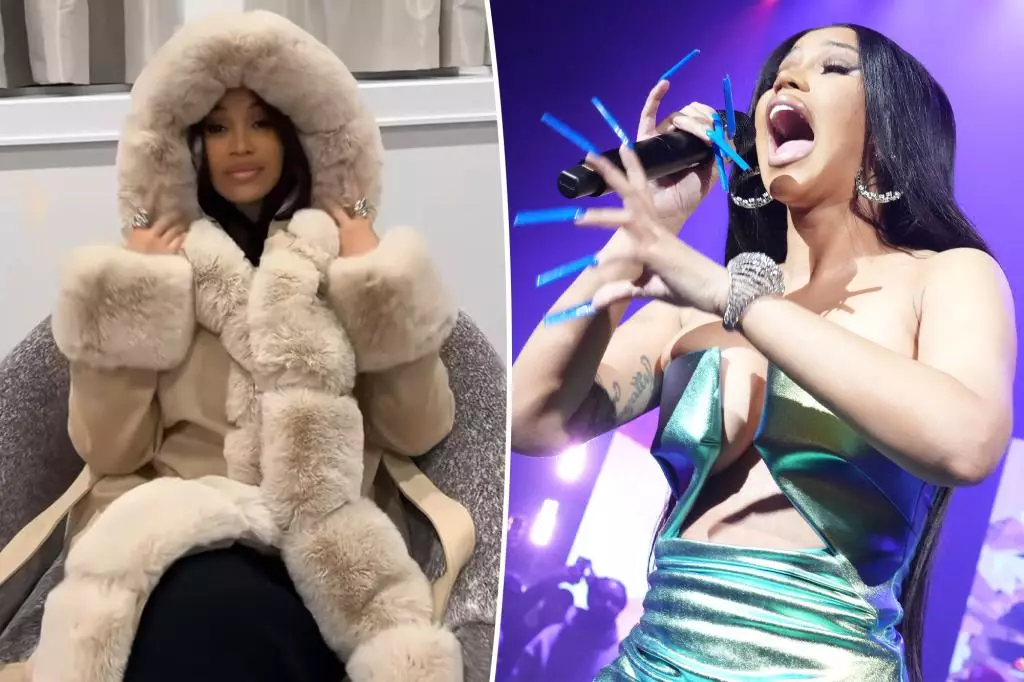In the world of celebrity culture, financial speculation about artists can often create waves of controversy. Recently, rapper and Grammy winner Cardi B found herself in the spotlight after a sponsored post promoting the clothing brand Shein raised questions among fans about her financial stability. This incident is particularly intriguing given Cardi’s high-profile lifestyle, marked by expensive tastes and lavish expenditures.
When the announcement of Cardi’s collaboration with a budget-friendly fashion line hit social media, it ignited a flurry of comments that questioned her brand loyalty and financial status. Critics challenged her decision to partner with Shein, a fast fashion label, suggesting that it was incongruent with her reputation for luxury fashion. Several social media users remarked humorously, comparing the Shein collaboration to a high-flying celebrity endorsing a low-cost airline, echoing the sentiment that Cardi’s identity is inherently tied to high-end brands such as Hermes and Chanel.
Cardi responded to these speculations in a voice note shared on X (formerly Twitter), asserting that the public’s perceptions of her financial situation were far from reality. “I could wake up tomorrow and sign a contract for millions,” she reassured her followers, reinforcing the notion that her wealth is substantial and accessible. This statement was not just a defense of her financial health but also served as a statement of power—asserting her status as a successful artist who actively manages her brand.
The rapper emphasized that her lifestyle isn’t just about survival; it’s about excess. Cardi revealed that her monthly spending amounts to approximately $3 million, a staggering figure that highlights both her success and the privileged lifestyle she enjoys. Interestingly, she divulged details of a negotiation for a potential tour deal, showcasing that even during her “off year,” financial opportunities abound. The deal in question suggested that Cardi could earn $1 million per show, totaling $65 million, demonstrating that her earning potential remains robust, despite her hiatus from album releases.
Cardi’s strategy is revealing; she is clearly navigating her career with a keen understanding of market timing. She noted her reluctance to engage in tour deals until her next album is announced, indicating a tactical approach that prioritizes maximizing her revenues. “You can’t act hungry when you’re not,” she stated, encapsulating a philosophy aimed at negotiating from a position of strength rather than desperation.
This incident underscores a larger theme within celebrity culture, namely the public’s often conflicting expectations of artists. Fans celebrate the aspirational elements of celebrity lifestyles while simultaneously scrutinizing their choices, particularly when those choices seem at odds with their established brands. Cardi’s experience serves as a case study reflecting the tension between personal agency and public perception.
Many fans quickly came to Cardi’s defense, highlighting her history of collaborating with accessible fashion brands early in her career. Reminders of her past partnerships with brands like Fashion Nova illuminated the desire for authenticity and relatability that many of her fans still appreciate. As her career has evolved, so too have her financial dynamics, but the crux of her connection with her audience remains—an artist who understands both the glamour and the grind.
Ultimately, Cardi B’s recent experiences spotlight the volatility in how audiences perceive wealth, success, and authenticity in the modern age. While financial speculation will continue to circulate around celebrity figures, what remains clear is that Cardi B is not merely a product of celebrity culture—she is an astute businesswoman wielding her narrative in a way that best serves her aspirations. The combination of public scrutiny, financial success, and her engagement with fans illustrates the complexity of being a contemporary artist in a world that is as judgmental as it is adoring.

